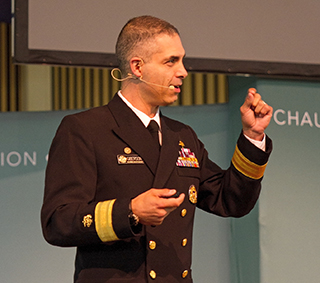LECOM brought its osteopathic philosophy of preventive, whole-person care to a national audience through its ongoing partnership with the renowned Chautauqua Institution.
In keeping with its mission of community service and promoting improved health for all, LECOM was the Presenting Sponsor of the Chautauqua Institution’s Weekly Lecture Series on health and wellness. The series’ topics and prominent speakers, including Rear Admiral Scott F. Giberson, Acting Deputy Surgeon General, were reflective of both the changing healthcare system and the health-related challenges facing the growing number of older adults.
 |
| Rear Admiral Scott F. Giberson, an honorary LECOM degree recipient, said collaboration among health care providers is vital to improving outcomes and lowering costs. Nearly 2,000 people attended his lecture. |
Rear Admiral Giberson, who in 2012 received an honorary Doctor of Science degree from LECOM, addressed nearly 2,000 people at the Institution’s Amphitheatre. As the leading pharmacist for the United States Public Health Service (USPHS), he noted that 270 million Americans visit a pharmacy every week, including many in need of guidance on their medications. While pharmacists are integral to improving outcomes and lowering costs, Rear Admiral Giberson also noted the importance of interprofessional collaboration among providers, to include pharmacists, physicians, dentists, nurses, and others.
“Health care providers have to be collaborative or we simply won’t be able to take care of everyone,” he cautioned.
Rear Admiral Giberson also discussed his hopes for a fundamental, paradigm shift: from health care to health. The former focuses on being reactive to sickness and disease – after it may be “too late” – while the latter emphasizes prevention and being proactive with regard to health and achieving positive outcomes. His message echoed the osteopathic philosophy of treating the “whole person,” as opposed to only the symptoms.
As the healthcare system struggles with the demands of caring for older Americans, prevention, to include diet, exercise, and lifestyle choices, will become even more important. Rear Admiral Giberson noted that 76 percent of all physician visits and 99 percent of all Medicare spending are related to the treatment of chronic conditions.
In addition to Rear Admiral Giberson, the Lecture Series included leaders from academic medicine, researchers, hospital executives, surgeons, and public health philanthropists as well as several LECOM physicians:
- Danielle Hansen, DO, Associate Director of the LECOM Institute for Successful Aging and Vice President of Acute Care Services and Quality/Performance Improvement at Millcreek Community Hospital, discussed “Women’s Health In An Aging Population.” She urged the attendees to receive regular screenings and said preventive measures are extremely important. Unhealthy habits, such as a poor diet, account for 82 percent of heart disease in women, she said.
- James Lin, DO, Vice President of Senior Services and Adult Living and Director of the LECOM Institute for Successful Aging, discussed frailty and how it can affect older adults. Frailty is typically characterized by declines in one’s mobility, strength, endurance, and increases the risk of falls and hospitalization. Dr. Lin noted that a Comprehensive Geriatric Assessment can help older adults better understand the symptoms and risk factors. He also emphasized the importance of exercise and activities, such as Tai Chi.
- Josh Tuck, DO, an Orthopedic Surgeon with the LECOM Sports & Orthopedic Medicine program, discussed arthritis and the range of treatment options available, such as oral supplements, injectable therapies, and surgery. The different options each carry varying levels of risks and benefits, he said. In some cases, older adults may need only to make slight lifestyle modifications. Like the other speakers, he emphasized the importance of exercise. “You rest, you rust,” he said.
- Carmine D’Amico, DO, Clinical Associate Professor of Internal Medicine/Cardiology at LECOM, discussed cardiovascular wellness. He discussed risk factors for cardiovascular disease, which is the leading cause of death in the United States, as well as specific risk interventions and goals. “Almost everyone can lower their cardiovascular risk through relatively simple lifestyle changes,” Dr. D’Amico noted. “Simple changes will make a difference.” For example, the risk of heart disease can be reduced dramatically by not smoking and by reducing one’s body mass index.
- Gregory W. Coppola, DO, Director of the LECOM Integrative Medicine Fellowship and Lifestyle Medicine program, discussed integrative medicine, including how it differs in its approach from “traditional” medicine. Integrative medicine can include nutritional and vitamin supplements, acupuncture, movement and exercise therapies, osteopathic manipulative treatment (OMT), meditation, and regenerative biomedicine.
LECOM’s sponsorship allowed nearly 100 members of LifeWorks Erie to attend a day of lectures at the Chautauqua Institution, located in western New York. LifeWorks Erie strives to offer programs and services so as to enhance lifelong learning, independence, and quality of life for older adults.
LECOM’s partnership with the Institution will continue in 2015, when the College will sponsor of a third series of related lectures.

